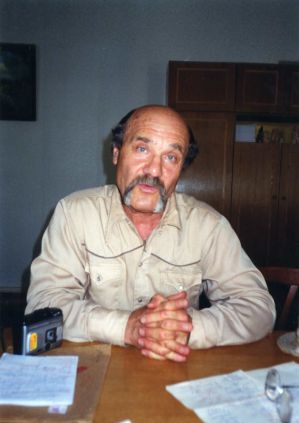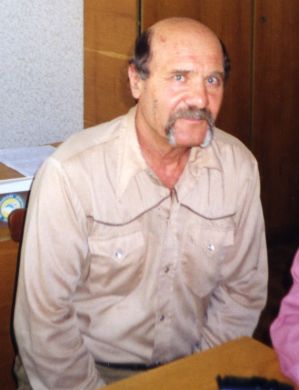OLEKSANDR IVANOVYCH DROBAKHA (born August 25, 1938, in the village of Oleksandrivka, Pryazovsk Raion, Zaporizhia Oblast).
A member of the Sixtiers movement. Teacher, writer, educator, publicist, and local historian.
His parents were farmers. His mother, Khrystyna Yukhymivna Nemyriuk, had an incomplete pedagogical education and worked as a kindergarten teacher. The family remembered its Cossack roots and passed down stories about Uncle Nychypir Nemyriuk’s participation in the 1918 events on the Black Sea squadron and about relatives imprisoned in the Solovki Islands. Thus, from childhood, Oleksandr’s worldview was free of “red-scarfed” illusions.
From 1955 to 1960, he studied at the Zaporizhia Pedagogical Institute, specializing in Ukrainian language and literature and the German language. He was interested in the literature of the “Executed Renaissance” and participated in literary circles. His first publications appeared in 1959. His youth coincided with a period of intensive Russification in the once-Cossack region. Yearning for the real Ukraine, he accepted an assignment in Galicia. For three months, he worked in the village of Piddnistryany, Khodoriv Raion, in the Lviv region. He traveled to Lviv for literary studio meetings. However, in the autumn of 1960, he was conscripted into the Soviet Army. He served until January 1963 in Ukraine and Germany, graduating from officer school.
In February 1963, Drobakha found a job as a German language teacher in the village of Lubyanka, Borodyanka Raion, Kyiv Oblast. He attended Dmytro Bilous’s literary studio at the “Molod” publishing house, where he met Vasyl STUS and other young members of the Sixtiers.
In August 1964, along with the poet Vitaliy Riznyk, Drobakha went to the construction site of the Kyiv Hydroelectric Power Plant. For three months, he worked as a rebar fitter at a reinforced concrete plant in the city of Vyshhorod, then taught German at an evening school for working youth. Simultaneously, in the “dungeon” of the dormitory where he lived, he created a historical museum that housed mammoth tusks washed out by dredgers, cartridges, coins, banknotes, and materials about the most interesting people of the Vyshhorod region.
A circle of young, nationally conscious workers who were drawn to Ukrainian culture gathered there. Drobakha organized the “Malynovi Vytryla” (Crimson Sails) literary studio, to which he invited intellectuals from Kyiv. Literary evenings with lively discussions that turned into political debates were held. The studio members tried to draw as many people as possible into the Ukrainian cultural atmosphere. Here, albeit in a smaller circle, it was said that Ukraine should be a sovereign, independent state.
Through the poet Volodymyr Komashkov, Drobakha met Viacheslav CHORNOVIL, who published a Ukrainian-language wall newspaper at the hydroelectric power plant construction site. Through them, samvydav literature arrived, which workers Oleksandr NAZARENKO, Vasyl KONDRIUKOV, and Valentyn Karpenko intensively reproduced using a photographic method, as well as organizing its typewritten reprinting. Books by M. Hrushevsky, V. Vynnychenko, Ye. Malaniuk, S. Petliura, D. Dontsov’s “Nationalism,” S. Shelukhin’s “Ukraine,” the almanac “Chervona Kalyna,” and others circulated.
In 1965, Drobakha, together with the Galician Bohdan Dyriv and O. NAZARENKO, visited Mount Makivka, the site of the first clash with Moscow after Hetman Mazepa (the battle of the Sich Riflemen with the Russian army from April 29 to May 2, 1915). He was at the premiere of the film “Shadows of Forgotten Ancestors” at the “Ukraina” cinema on September 4, 1965, where, at the call of I. DZIUBA, V. CHORNOVIL, and V. STUS, they protested against a new wave of arrests. He visited the Ivan Honchar Museum in Kyiv and met with Borys ANTONENKO-DAVYDOVYCH.
The “Prague Spring” resulted in the banning of Oles Honchar’s novel “The Cathedral” in Ukraine and an intensification of repressions. In June 1968, sensing the threat of arrest, Drobakha took a vacation and hitchhiked along the Dnipro River to Ukraine’s memorable places: Pereiaslav, Shevchenkove, Chyhyryn, Kholodnyi Yar, Kapulivka, and Khortytsia Island, to feel his native land with his own feet. He was struck by the uprooted oaks in Viunyshche, which Shevchenko had once painted, and the scenes of desecration of historical monuments.
Meanwhile, on June 26, 1968, O. NAZARENKO was arrested, followed by V. KONDRIUKOV and V. Karpenko. During a search of the museum, a suitcase of Drobakha’s papers—manuscripts of his literary works, notes, and a diary—was confiscated. The Party bureau ordered the Komsomol members to destroy the museum. Drobakha happened to arrive at that moment and saved most of the exhibits. He had to move out of the dormitory and into an apartment.
KGB officers confiscated a notebook from O. NAZARENKO, based on which about 30 people, including Drobakha, were interrogated. During interrogations, Drobakha adhered to the rule of saying as little as possible and admitting nothing to the end. He was only unable to deny two episodes, which was not enough to open a case against him. He was one of 25 witnesses in the “Nazarenko case.” In January 1969, at the Kyiv-Vyshhorod trial, O. NAZARENKO was sentenced under Part I, Article 62 to 5 years of imprisonment, V. KONDRIUKOV to 3 years, and V. Karpenko to 1.5 years. The Vyshhorod Sixtiers were scattered to the winds.
Surprisingly, in 1969, the “Radianskyi Pysmennyk” publishing house released Drobakha’s small book of poetry, “Paporot” (The Fern)—in a yellow-and-blue dust jacket! Of course, it was pulped, and only a few copies were saved. Drobakha’s path to literature was blocked, and he was knocked out of the literary process for 15 years. But he did not waste time; he worked on self-improvement and studied the revolutionary experiences of peoples who had freed themselves. In 1970, he married Larysa Pavlivna Panasiuk and raised children: daughters Yaroslava (1970–1999) and Halyna (1972), and son Taras (1970). He worked as a teacher, instructing workers. It was almost impossible to get public life moving. He organized a literary studio at the district newspaper, but it was far from the free-spirited environment of the 1960s. He worked in the Society for the Protection of Historical and Cultural Monuments. For some time, he traveled with lectures throughout the region, but he was dismissed for his lecture “The Culture of Kyivan Rus.”
As soon as the regime began to weaken, Drobakha began to act energetically. On February 4, 1989, an organization of the Society for the Ukrainian Language was created in Vyshhorod—the 20th in Ukraine—and Drobakha became its head. That year and in the following years, the Society held large-scale commemorations of T. Shevchenko. In 1988, Vyshhorod had 6 Russian-language kindergartens and 2 Russian-language secondary schools; just two years later, they were converted to the Ukrainian language. Drobakha was an organizer of numerous rallies, the Ukrainian Helsinki Union, and the Ukrainian Republican Party. In 1991, he was elected deputy chairman of the Kyiv Oblast URP organization, and since 1990 he has headed its district organization. He was also one of the initiators of the creation of the Congress of Ukrainian Nationalists and the Congress of the Ukrainian Intelligentsia. From 1989 to 1990, he was the chairman of the Vyshhorod organization of Rukh (the People’s Movement of Ukraine).
In 1983, the “Molod” publishing house released Drobakha’s book of poems “Tverdynia vesny” (The Stronghold of Spring), which included poems from 1964–1981; in 1987, “Vyshhorod sertsia” (Vyshhorod of the Heart) was published by “Ukrayinskyi Pysmennyk”; in 1996, the historical-literary booklet “Vyshhorodu – 1050” (Vyshhorod is 1050) and the artistic-publicistic book “Vyshhorod semy vitriv” (Vyshhorod of the Seven Winds) (Rada publishing house); in 2000, the poetry collection “Ukrayinska vesna” (Ukrainian Spring) (“Ukrayinskyi Pysmennyk”); in 2005, the booklet “Mezhyhirskyi Spas” (The Mezhyhiria Savior) (Siome Nebo publishing house); in 2006, the artistic-publicistic book “Ukrayina nashoho zhyttia” (The Ukraine of Our Life) (Smoloskyp publishing house). Since 1959, he has had several hundred publications in the press and in collective anthologies (poems, publicism, reports, leaflets).
He is a member of the National Writers’ Union of Ukraine (1997), deputy chairman of the Kyiv Oblast organization of the NWUU, chairman of the Vyshhorod district association of “Prosvita” named after T. Shevchenko, a member of the presidium of the district organization of the People’s Union “Our Ukraine,” an honorary citizen of Vyshhorod (2005), and a pensioner.
Bibliography:
I.
Oleksandr Drobakha. Vyshhorod semy vitriv [Vyshhorod of the Seven Winds]. – K.: Rada, 1999. – 152 p.
Oleksandr Drobakha. Ukrayinska vesna. Poeziyi [Ukrainian Spring. Poems]. – K.: Ukrayinskyi pysmennyk, 2000. – 76 p.
Oleksandr Drobakha. Ukrayina nashoho zhyttia [The Ukraine of Our Life]. – K.: Smoloskyp, 2006. – 272 p.
KhPG Archive: Interview with O. Drobakha, July 20, 2000. https://museum.khpg.org/1374852975
II.
Mizhnarodnyi biohrafichnyi slovnyk dysydentiv krayin Tsentralnoyi ta Skhidnoyi Yevropy y kolyyshnoho SRSR. T. 1. Ukrayina. Chastyna 1. [International Biographical Dictionary of Dissidents in Central and Eastern Europe and the Former USSR. Vol. 1. Ukraine. Part 1]. – Kharkiv: Kharkiv Human Rights Protection Group; “Prava Liudyny,” 2006. – pp. 234–237. https://museum.khpg.org/1184357546
Rukh oporu v Ukrayini: 1960–1990. Entsyklopedychnyi dovidnyk [The Resistance Movement in Ukraine: 1960–1990. An Encyclopedic Guide] / Foreword by Osyp Zinkevych, Oles Obertas. – K.: Smoloskyp, 2010. – pp. 220-221; 2nd ed.: 2012. – pp. 243–244.
Vasyl Ovsiienko, Oleksandr Drobakha. Kharkiv Human Rights Protection Group. Last read August 7, 2016.

